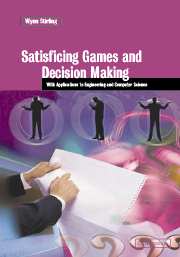9 - Meliority
Published online by Cambridge University Press: 12 October 2009
Summary
The protest of common sense [is] the complaint of mere habit.
Michael Polanyi, Personal Knowledge (University of Chicago Press, 1962)Principles of rationality serve as normative models of behavior, but rationality can never be anything more than an ideal. Even the most determined adherent to a particular code of rationality must recognize that circumstances often prohibit the attainment of the ideal in practice. This realization, however, should not change the standard that is sought. Indeed, failure to achieve the standard should serve as motivation to improve the ability to perform, rather than a rationale for lowering the standards.
Perhaps the most salient criticism of satisficing à la Simon's aspiration levels (see, e.g., Levi (1997) and Zeleny (1982)) and other forms of ‘bounded rationality’ is that they condone the deliberate acceptance of a solution that is less than the ideal. In terms of human behavior, deliberately falling short of achieving the goal to which one has made a commitment may be disingenuous, but at least the decision maker can mount an explanation for his or her failure. One possible explanation for a decision maker who has apparently committed to optimality only to equivocate is that, after all, he or she is not really an optimizer, but is merely using the tools of optimization to find a solution that is good enough. If it happens to be optimal, so much the better, but that would be a bonus, not a necessity.
- Type
- Chapter
- Information
- Satisficing Games and Decision MakingWith Applications to Engineering and Computer Science, pp. 205 - 214Publisher: Cambridge University PressPrint publication year: 2003



